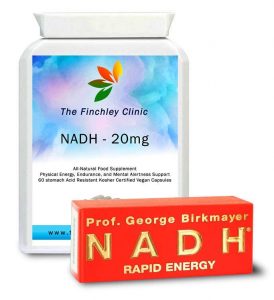Did you know that the most promising natural substance in your body is called NADH? Never heard of it? Well, that’s not surprising; you’re not alone – many people haven’t. To give its full name, reduced nicotinamide adenine dinucleotide, NADH is created in the body from the organic compound niacin, a form of Vitamin B3. And, according to research, it’s very important for a healthy, fully-functioning body.
This is down to the fact NAHD helps in the crucial process of energy production in the body’s cells – and because of this, its adherents believe it could well help sufferers with chronic fatigue syndrome (CFS), also referred to as myalgic encephalomyelitis or ME.
All of which means it may come as no surprise to you that one of our most popular products here at The Finchley Clinic is NADH Rapid Energy, the highly acclaimed supplement form of NADH (in addition to NADH Delayed Release Capsules).
So, why exactly does the body need NADH?
The belief that NADH is the body’s most promising natural substance is one certainly shared by Professor George Birkmayer. Surely one of the world’s foremost experts on the subject, Birkmayer is the creator of NADH Rapid Energy and he believes, along with other experts, that NADH isn’t just capable of boosting energy levels, but also of improving mental clarity, alertness, concentration and memory maintenance (some proponents of the substance also, therefore, believe it may help those living with Alzheimer’s disease).
But how might it help with these things? NADH operates in the body by reacting with the oxygen present in living cells – every one of them in the body – thus, it’s inevitably involved when cells generate energy and water (not least because one of the key ingredients of NADH is biological hydrogen, the fuel for cellular energy production.). Naturally then, this means that the more NADH a cell can call on, the more energy it can generate and so the better it can function and the longer it can live.
And, make no mistake, for the major organs of the body, if their cells can call on more – rather than less – NADH, it’s a significant thing. Boosting the levels of NADH in your body is good news, indeed, for your lungs, liver, kidneys and, especially, your heart and brain, because it means they can draw on more energy; the very parts of the body that require the most energy.
Of course, the body itself produces its own levels of NADH, but enhancing these levels via external supplementation (courtesy of NADH Rapid Energy) helps your major organs to function as efficiently and successfully as they can.
How might NADH help with chronic fatigue syndrome?
This topic has generated a lot of debate among experts, but adherents of NADH claim it may be beneficial to sufferers of ME/ CFS because:
- NADH helps the conversion of food (glucose) into energy in cells via the cellular respiration process, which sees glucose turned into adenosine triphosphate (ATP); some studies have found that ME/ CFS results in low levels of ATP
- With research having also shown that NADH is capable of stimulating brain function, experts believe this means the substance may help lessen ME/ CFS-related cognitive dysfunction
- Thanks to NADH restoring mitochondria function in the body, it’s believed the substance may be able to reduce ME/CFS-caused fatigue (chronic fatigue syndrome may well contribute to mitochondrial dysfunction)
- Experts also claim NADH has the capacity to help the brain generate neurotransmitters (chemical messengers; such as serotonin, norepinephrine and dopamine), which are critical in shaping mood and influencing cognitive function.
In terms of cognitive function, in particular, one of several studies has focused on the combined use of NADH plus coenzyme Q10 (coQ-10) among ME/ CFS sufferers; it found that among a group of 73 women, subjects reported better physical and cognitive function when taking NADH and CoQ-10 supplements than when taking a placebo. Additionally, the combined use of the two substances improved ATP concentration in the subjects’ bloodstreams.
Similarly, another study has discovered that, again, when NADH and CoQ-10 were combined, they achieved successful results in reducing post-exertional malaise, one of the major ME/ CFS symptoms. Meanwhile, in reviewing several studies, the publication BMC Complementary and Alternative Medicine came to the conclusion that, along with magnesium, NADH is the only substance, taken in supplement form, to result in an improvement in ME/ CFS symptoms.
Can you boost NADH in the body through food?
The answer to this question is yes; for the most part, NADH can be found in the muscle tissue of fish, some meats, such as poultry, and foods featuring yeast. However, naturally, that isn’t much help for those with certain diets, not least vegetarians and vegans, Moreover, it’s important to note there’s little consensus on whether it’s actually possible for the body to access NADH from food effectively, as food-derived NADH may not be redistributed about the body properly. Niacin, though, which – as noted above – is the organic compound from which the body naturally forms NADH, can be absorbed from food; it occurs in the likes of asparagus, avocados, broccoli, peanuts, potatoes and oily fish.
So, what does all this point to? Well, the inevitable conclusion has to be that, to boost your body’s NADH levels, your best option is supplementation. And, without doubt, if you’re an ME/ CFS sufferer and yet to try either product, giving NADH Rapid Energy (or NADH Delayed Released Capsules) a go may well help you deal with the illness on a daily basis. Even if you’re fortunate enough not to have ME/ CFS, taking NADH as a supplement should boost the energy levels in your body’s cells, ensuring they’re better able to produce the components essential for human life and function better and live longer.

